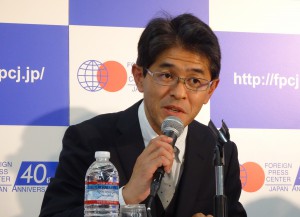Date : November 9, 2016
Report: White Paper on Crime 2016 (Mr. Hideki Tanaka, Deputy Director of the Research Department at the Research and Training Institute of the Ministry of Justice)
post date : 2017.01.17
 On November 9, the FPCJ invited Mr. Hideki Tanaka, Deputy Director of the Research Department at the Research and Training Institute of the Ministry of Justice, to talk about the White Paper on Crime 2016. This briefing had a total of 17 attendees, including 12 journalists from Bangladesh, Belgium, Brazil, France, Singapore, South Korea, Taiwan and others.
On November 9, the FPCJ invited Mr. Hideki Tanaka, Deputy Director of the Research Department at the Research and Training Institute of the Ministry of Justice, to talk about the White Paper on Crime 2016. This briefing had a total of 17 attendees, including 12 journalists from Bangladesh, Belgium, Brazil, France, Singapore, South Korea, Taiwan and others.
Based on statistics up to 2015, the white paper describes and analyzes crime trends in Japan, and includes a special report on the state of recidivism and measures to prevent it.
Mr. Tanaka started by explaining that the number of reported crimes had decreased for 13 years in a row since peaking in 2002, reaching a postwar low in 2015. However, he also explained that incidents of stalking, child abuse, and “special fraud” including bank transfer scams had all increased, and that persons identified to have violated the Stimulants Control Law stays over 10,000 every year since 2006.
He then described notable points about the current crime statistics.
The number of persons 65 or over to have cleared for the Penal Code offenses in 2015 has increased approximately 3.8 times in the past 20 years, thus these seniors now account for about 20% of all adults persons cleared for the Penal Code offenses. Of those seniors who go to prison, nearly 70% has previous history of imprisonment. The number of women cleared for the Penal Code offenses has decreased since its peak in 2005, but they account for around 20% of all adult Penal Code offenders in recent years. Of those women cleared, approximately 30% are seniors, and about 80% of those senior women have committed shoplifting.
He explained that the background reason to select recidivism and measures to prevent as the topic for the special report in this white paper was the government initiatives to reduce crime, with the aim to make Japan as “the safest country in the world.”
In 2015, as he elaborated, approximately 60% of all newly admitted prison inmates has previous history of reimprisonment, Also among those released from a prison in 2011, nearly 40% returned to a prison within five years, and about half of those returned within two years. Of those released from prison in 2014, 18.5% had returned to prison by the end of 2015 (reimprisoned rate within two years). Comparing the rate of reimprisonment within two years by age groups, although the reimprisonment rate among seniors is on a downward trend when looked at over a 10-year span, it is still higher than the rates for other age groups. By gender, although the rate of reimprisonment for women is lower than that of men, it is on a slight upward trend. By the types of offense, the reimprisnment rate for theft is 23.3%, which is higher than other offenses but is on a downward trend when looked at over a 10-year span. The recidivism rate for stimulants, instead, is around 20%, but increased by 1.2 points over the previous year for inmates released in 2014. Those inmates imprisoned for theft or stimulants offenses are to be noted for having higher rates of recidivism in addition to the fact they account for approximately half of the all inmates released from prison in a given year.
Mr. Tanaka concluded by saying that, based on the results of these analysis of reimprisonment rates, more focused initiatives were necessary to deal with seniors, women, theft, and stimulants.
Questions during the Q&A session included the number of gun murders and clearance rate , the reasons for the increase of senior crime and the decrease of youth crime, the situation for foreigner crime, and the reason for the high non-prosecution rate.
平成28年版犯罪白書(Japanese only)
[Note]
If you have released an article, photo, or video based on our press briefing report, please provide us with the (1) title of the piece, (2) author’s name, (3) date of publication/release, and (4) a copy of the piece or a link (if available), via email (cp[at]fpcjpn.or.jp).
*Please replace the “at” with “@” when you send the email.



